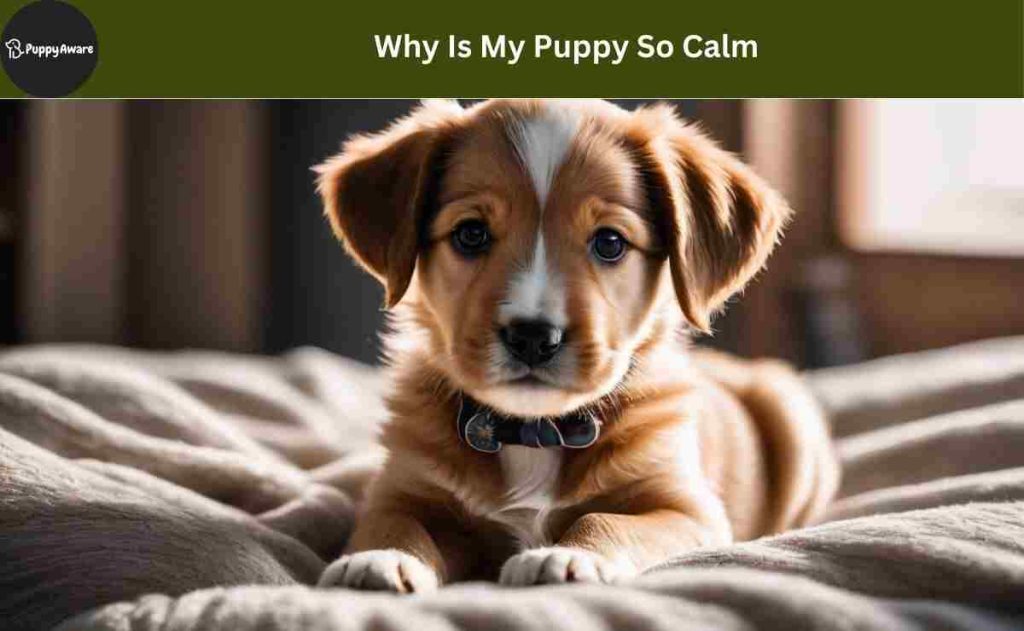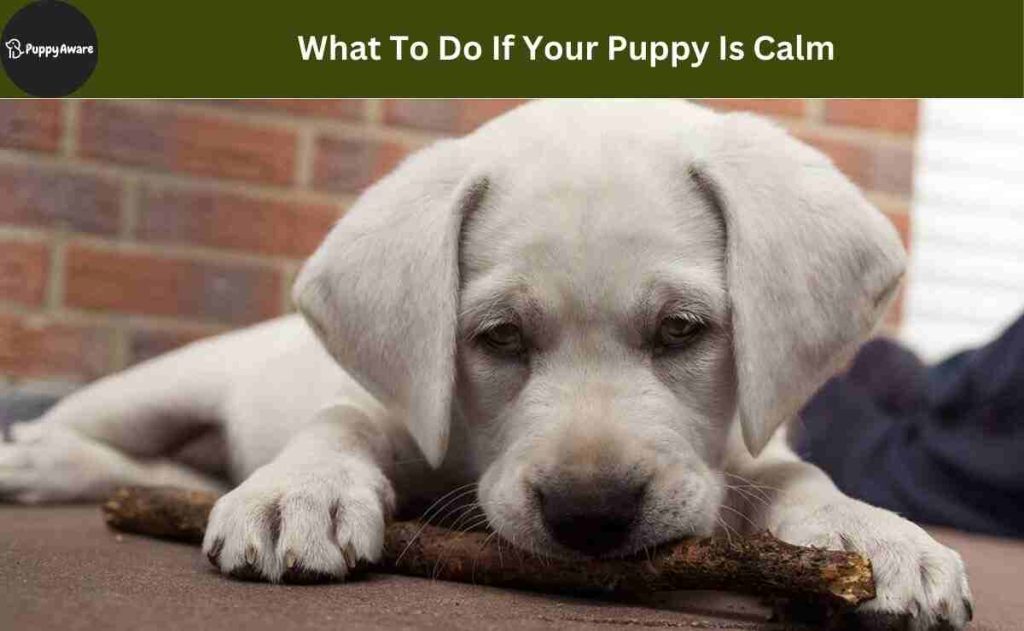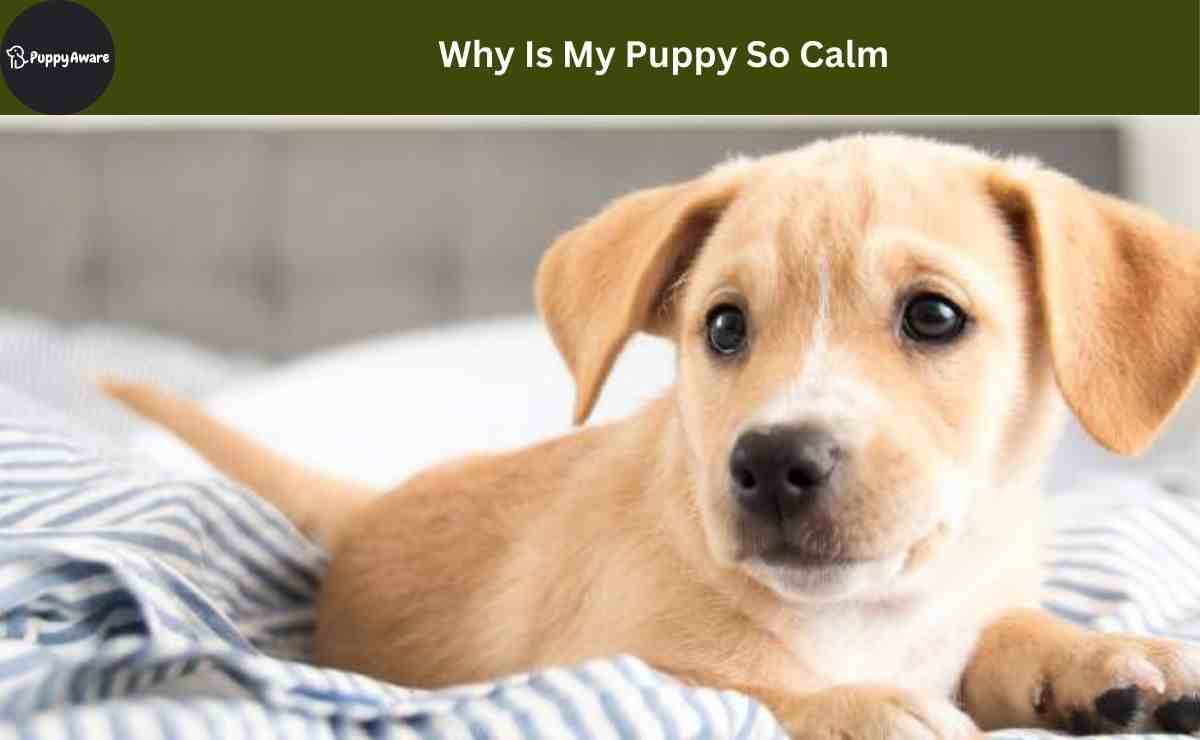Puppies are energetic and playful in nature. So it can be quite surprising when you find that your puppy is unusually calm. Though every puppy has their individual personality, being too calm can be a sign of underlying health or mental issues.
You must dig out why your puppy is so calm. There can be several reasons such as breed type, environment, health, or socialization. In the below section, you can know in-depth expiation of these reasons.
Why Is My Puppy So Calm – Know 7 Top Reasons

Puppies are so energetic and playful because they keep exploring the new world. They move to every corner of the house because of their curiosity and eagerness to learn new things.
However, if your puppy is overly calm, it can be a sign of something wrong. It is important to identify the cause of your puppy’s calmness and address it as soon as possible.
Here are some reasons behind calm behavior.
- Breed Type
All puppies don’t come out with the same level of energy; some come out of the womb with a mellow attitude. So your dog may be calm naturally.
However, the breed of your dog plays a significant role in determining their energy levels and maturity. If you walk to the dog park, you can see some dogs are more energetic than others.
Dog breeds like Border Collies, Dachshunds, Terriers, and Greyhounds have high energy levels right from the start. These breeds maintain their vivacious nature well into adulthood, albeit in a more controlled manner in their puppy days. That’s why they often train for work or sports events.
On the contrary, certain breeds like the Golden Retriever, are known for their calm disposition. If your dog belongs to such a breed, their peaceful nature is natural. If you don’t want unnecessary mess, their calm behavior is like a blessing.
- Age
Age plays a significant role in a puppy’s behavior. Young puppies, especially those that are between 8 and 16 weeks old, tend to have bursts of energy followed by periods of rest and relaxation.
During this period, puppies tend to sleep a lot to support their growth and development. It’s perfectly normal for puppies to be calm during these times.
When your puppy is about 4 months or older, their energy level will be high. They will push the boundaries and engage in exploring the surroundings.
Further, at one or two years old, your dog will reach the adulthood stage. During this time, their energy level will decrease and be calmer.
- Temperament
Another reason your puppy may be calm is their individual temperament. Just like humans, each puppy has their own unique personality traits. Some puppies may naturally be more laid-back and relaxed, while others may be more active and energetic.
If your puppy has a calmer temperament, it’s perfectly normal for them to exhibit a more tranquil demeanor.
- Socialization
If you’ve got more than one dog, things change quickly, especially if there are older dogs around. When new puppies join the gang, they automatically become the little guys on the block.
Even though we may not get all the details about how dogs sort things out, you can see older dogs making sure the younger ones know their place. Older dogs prefer a calm routine and don’t have time for all the crazy energy of a young pup.
It’s like a built-in system where everyone figures out where they fit, making sure there’s some order in the doggy house. So this type of situation can make your puppy calm.
- Gender
When it comes to growing up, female dogs speed through the process pretty fast. By the time they reach six to nine months old, many are ready to have babies. So this biological milestone also brings a more relaxed attitude.
Now, for the guys, it’s a different story. Male dogs take a bit longer to hit maturity. So, whether it’s the quick journey to maturity for the female dogs or the slightly longer road for the gents, each dog has its own pace in reaching that grown-up stage.
- Mental Stimulation
The environment in which your puppy is raised can influence their behavior. If your puppy is provided with a safe, calm, and structured environment, they are more likely to feel secure and exhibit a calm demeanor.
On the other hand, if they are exposed to chaotic or stressful surroundings, they may become anxious or hyperactive. In the early years of your dog’s life, it’s vital to introduce them to a variety of new experiences. This helps lower the chances of future issues like aggression or anxiety.
One way to achieve this is by taking your dog on walks and outdoor adventures. If a puppy spends most of its time stuck at home during its growing years, it might take longer for them to settle down. That’s because, mentally, they’re a bit younger.
- Health
If your puppy is experiencing any medical issues or discomfort, they may exhibit unusual calmness. Sudden calmness could signal an underlying illness. If you suspect illness, consulting with a vet is the best course of action.
Moreover, just like humans, dogs need their daily dose of exercise. Lack of physical activity can lead to behavioral issues, and if your dog isn’t getting enough exercise, their calmness might be a result of boredom or potential health concerns. Ensure your pup gets the right amount of daily exercise to keep them happy and healthy.
Consider the food your dog consumes. If your puppy becomes calm shortly after eating or if there’s been a recent diet change, it might be a dietary factor. Check what you’re feeding your dog to ensure it aligns with their nutritional needs.
What To Do If Your Puppy Is Calm?

If your puppy dog is calm or notices sudden calmness, there are several steps you can take to ensure their well-being
- Vet Visit
If you suspect illness or your dog’s sudden calmness is accompanied by unusual behavior, a visit to the vet is crucial. Discussing their diet with the vet can also shed light on whether it’s contributing to their calm demeanor.
- Dietary Adjustment
Re-consider your dog’s diet. A poor or inadequate diet might be the culprit. Check what you’re feeding your furry friend and consider consulting the vet to ensure they’re getting the right nutrition.
- Exercise Routine
Puppies need a good amount of daily exercise, sometimes up to an hour. If your dog isn’t getting enough exercise, try incorporating activities beyond a simple walk. Games like fetch can be a great way to keep them active and engaged.
- Engaging Toys
Provide your dog with stimulating toys to combat boredom. Puzzle games and specially designed dog toys, available online, can keep them entertained and mentally engaged.
By taking these steps, you can effectively find out the real cause of your puppy’s calmness. Provide him with enough attention and positive reinforcement. This will help him to develop better behaviors.
Conclusion
Most dogs naturally start calming down between the ages of six to nine months. As they approach full maturity, typically between one to two years old, that exuberant puppy energy tends to be higher.
There are a number of reasons why your puppy is calm. Factors such as age, individual temperament, environment, and health can all contribute to their behavior.
If you have any concerns about your puppy’s temperament or behavior, it’s always best to consult a professional, such as a veterinarian or a professional dog trainer.
